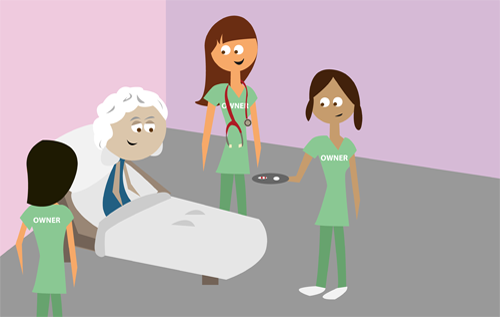
Curing an Ailing Workforce
by Patrick Egan
The health care workforce for older patients is unwell. Too few doctors have the skills particular to the elderly, with their multiple chronic conditions. And direct-care workers — nursing assistants and home care aides — earn paltry wages and garner little respect.
The health care industry will need to recruit and prepare millions more professionals.
Two innovative efforts:
Dr. Sharon Levine figures that if the medical community can’t lure more doctors into geriatrics, then Boston University Medical Center will bring geriatrics to doctors.
Levine leads its Chief Resident Immersion Training program. Over the past two years, weekend boot camps focused on the elderly’s medical issues have drawn 128 doctors from across the country.
“If we can geriatricize them, if we can change how they see the world, we can really change the culture in an institution,” says Levine.
The geriatrics specialty has struggled to establish its importance. Only 11 percent of medical schools require their students to complete a geriatrics rotation. "Pediatrics has done a really good job of defining that kids have different medical needs. People still don't get that about older people," says Tracy Harris, who directed a 2008 Institute of Medicine report on the elder care workforce.
Moreover, geriatricians earn the lowest salary of any medical specialty, one reason a 2007 study by researchers at the University of Cincinnati showed a 20 percent decline in the ranks of certified geriatricians over 10 years.
While medical schools can’t force doctors to specialize in geriatrics, they can make sure graduates have the skills to treat older patients. Dr. Skip Nitardy, now teaching at Marshall University’s medical school, went through the immersion program twice; now he teaches his residents about delirium
“It's real scary for family members, but it's something we can recognize and treat," says Nitardy. Through the program, he learned to communicate better with both families and older patients. "They've fought the world wars and built the country, and they deserve our best," he says.
Aides don’t just work for Cooperative Care in southern Wisconsin; they own a piece of the business, a possible key to keeping workers satisfied in a field where turnover creates a constant problem.
“This profession is so undervalued. If it wasn't for our direct-care workers, I don't know how health care would manage," says Tracy Dudzinski, president of Cooperative Care’s board.
The co-op’s members help manage the organization. "If you think something can be better, you bring it to the board and it's taken seriously," says Dudzinski.
Their engagement in the job has translated into a more stable, more experienced staff. Nationwide, more than 70 percent of certified nursing assistants quit their jobs each year, according to the Institute of Medicine. Turnover among Cooperative Care’s 80 members stays below 10 percent. It helps that the co-op pays slightly above average wages and that everyone shares in profits.
The co-op is not an easy model to duplicate, warns Stu Schneider, who heads the 1,600-member Cooperative Home Care Associates in the Bronx, N.Y. Industry consolidation has made it difficult for small co-ops to achieve the scale large providers require. And building organizations takes time. With the first boomers turning 65 next year, time is the enemy.
“These are all things that we've known about,” says Harris, of the Institute of Medicine. “It's not a pipeline that suddenly burst in the ocean … We don't address these issues before they become a crisis.”
News21 Fellow Alex Berg contributed to this report.
-

A Way to Ensure Retirement
Most Americans fail to prepare financially for retirement. One economist has proposed taking the choice out of saving.
-

A Doctor in the House
By reviving a practice from the past — house calls — the health care industry may be able to slash costs even as doctors give greater attention to older patients.
-

From Hospital Halls to Cyberspace
Telemedicine or e-care—technologies including remote patient-monitoring or videoconferencing—may prevent costly emergency room visits, hospital stays and nursing home use.
-

Rethinking Retirement
For millions of aging workers, the retirement age is sliding further away. Some will have to keep working; others will want to. Analysts ponder ways to make added work years viable and rewarding
-

Finding a Home to Grow Old In
Seniors want to age in place, but most will eventually require care. New senior housing options mix independent living with services as needed.
THIS PACKAGE IN DEPTH
To read about how this story came together and the reporters involved
Click Here.
To see this story as part of a larger package published on Washingtonpost.com
Click Here.